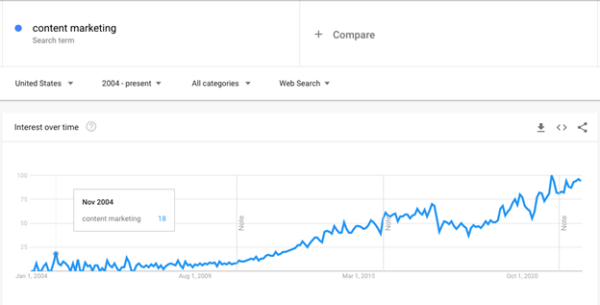Historically, many businesses started their content marketing programs because they believed it would help them rank higher for organic search results. When their target audiences would search for potential solutions to their needs and wants, they would find the brand’s vast array of content and believe that brand is the one that provides the most value.
Unfortunately, what many businesses discovered was that a foundation built on being “found” in search meant they had to focus on content that chased traffic. That created an inherent pressure to create content designed to rank rather than content intended to lead, entertain, or inform.
Successfully organizing content to optimize organic search has become more difficult over the last decade. The quality of competition, the sheer quantity of content, and the growth of paid search advertising have made digital real estate on the first page of Google more expensive and more challenging to maintain. And appearing on anything but the first page is not just second place; it is tantamount to failure. As my good friend and SEO expert, Arnie Kuenn used to say jokingly – “the best place to hide a dead body is the second page of Google results.”
However, the classic SEO-first mentality still exists in building a case for a content marketing platform. In two recent conversations, clients expressed frustration about where they were in launching their new content marketing program.
Each had asked their digital agency to help them identify the best way to bring their content marketing program to life. In each case, the consultants came back with a 30-slide deck making the business case for content marketing by saying:
- Your audience searches Google X times.
- Here are the most popular search terms.
- Here’s what they are finding.
- Here are the terms they search that you care most about.
- Here is the gap (in other words – what they are not finding).
- Conclusion A: The number of searches you care about is limited.
- Conclusion B: The number of answers for the terms you care about and your audience isn’t finding is low (it’s going to be hard to compete).
- Recommendation: Focus short-term on creating content about the terms you care about but for which your audience isn’t finding answers. Focus long-term on competing for the highly sought-after keywords. Put simply: Game on – let’s start creating a lot of content.
- Last slide: We can help you with creating that high-quality content that will compete for that precious real estate on the front page of Google search results.
Now, if it sounds like I’m denigrating the fine work that good SEO firms do, let me be clear that I’m not. I absolutely understand good firms do amazing work in this space that goes well beyond my pay grade.
But that slide deck illustrates an all-too-common argument for launching a modern content marketing program. It presents two problems. First, SEO has arguably never been a good foundation for a content marketing platform. Second, and more importantly, is that web search itself changes in a way that fundamentally changes the content marketing equation.
#SEO has arguably never been a good foundation for a #ContentMarketing platform, says @Robert_Rose via @CMIContent. Click To Tweet
Let’s look at each.
HANDPICKED RELATED CONTENT:
Lesson 1: Google isn’t here for your brand
Google has never been interested in helping you build an audience for your brand’s platform. Quite the contrary, it has always been interested in you helping them build an audience for theirs. They designed web search as a helpful tool to create just enough commoditization in results that advertising featuring exactly what the searcher seeks is more attractive.
In today’s world of web search, using Google results to form the foundation of your content marketing strategy is like watching the freeway from an overpass to determine what kind of car you should buy. Sure, you can count the traffic, but you have no idea about the value of any one of the cars.
You can’t know the social or emotional context of your audience’s needs or wants by seeing if they find what they’re looking for on Google. All you can tell by looking at search velocity and keyword competition is whether a topic is popular and/or well-covered.
For example, a high search volume term may indicate a huge search audience. But it also could indicate many in the audience find it difficult to filter anything that differentiates (and thus might not rank well). Therefore, popular search terms might indicate an audience desperately trying to find good quality content on a topic (so they search for it frequently). In those cases, you would mistake popularity for frustration.
On the other hand, a low search volume may indicate a small audience, making it not worth the time trying to rank for that keyword. Or perhaps the low volume indicates tomorrow’s new hot topic that few have thought to try and find it.
For example, if we used search volume in 2009 to decide whether to launch a platform to evangelize the topic of “content marketing,” we probably would have decided against it. Look what we would have missed. (In 2009, the term “content marketing” was 18. By 2020, it had grown to 100.) Spoiler alert: We didn’t look at the SEO of the term.

You should know more about your audience than Google does. When formulating a new content marketing platform, you should realize that Google search has been (and is) helpful for understanding the zeitgeist of popular topics and terms. But it hasn’t been as helpful in understanding what your audiences will be interested in tomorrow.
You should know more about your audience than @Google does, says @Robert_Rose via @CMIContent. #SEO Click To Tweet
Too many SEO plans for content marketing platforms feel like they are always chasing their tail. Teams spent 12 months chasing traffic on keywords popular a year ago. By the time they see progress, it’s too late. Great, you’re on the first page of Google, but it’s for a term no one cares about anymore.
But what’s changing now is even more important to content marketing. The transition of web search itself is incredibly important – and your business case must reflect this.
Lesson 2: Google still isn’t here for you
Content discovery is changing the way audiences interact with digital content. And Google still isn’t interested in that happening on any channel other than Google.
New research, as detailed in Search Engine Journal (SEJ), shows that 30% of search users are “forced to redo their search queries in order to find what they’re looking for.”
30% of search users must redo their queries to find what they’re looking for according to @sejournal research via @Robert_Rose @CMIContent. Click To Tweet
Audiences become more and more frustrated with the results Google provides. Many are simply wrong or unhelpful. The SEJ article references a user who searched for “calories in a bottle of wine.” The rich content returned on the search page showed 123 calories (the amount in one glass of wine). As the user exclaimed: “I swear Google gets dumber by the day.”
But interestingly, this isn’t because Google is getting dumber; it’s because Google is getting smarter. Of course, that “wrong” result is an early indicator that it can get smarter.
Consumption of digital content, and its sheer quantity, are getting to a place where broad informational searches are less efficient and useful. Instead, many search platforms, social media, and other big content platforms are leaning into what’s called content discovery.
Content discovery might be best described as “content recommendations.” The discovered or recommended content is delivered without an explicit ask. In the wine example, Google assumes what the searcher meant to ask and provides the answer. Google knows a lot more people care about the number of calories in a glass of wine than people who want to know how many calories are in a bottle. Thus, Google served up that knew content before the searcher even that’s what they wanted.
If you’re looking for the best example of content discovery, look no further than the astronomical rise of TikTok. The TikTok experience delivers more and more relevant content as the viewer uses it more and more. To varying degrees, “recommended” articles at the bottom of blogs follow the content discovery idea.
Content marketers should see this discovery trend growing. Content suggestions based on a customer’s intent, demographics, and other first-party data are growing in thought leadership resource centers, websites, and e-commerce platforms.
From a web search perspective, the manifestation of content discovery is that the content appears on the results page. Searchers don’t even need to click to get the basics of that enhanced content. While today that content may be wrong. Tomorrow, it will be better. And next week, it may be better than yours.
Remember, Google is still not trying to help you – the content creator.
HANDPICKED RELATED CONTENT:
Content marketing starts with your audience
If you look to launch a new content marketing platform, look at something other than search optimization as the core benefit. Those days are gone if they ever really existed. Yes, learn about SEO and how the evolution of search into content discovery will affect how your content is distributed.
Again, I’m NOT suggesting you stop employing the best practices of SEO, especially as they evolve in the content discovery direction.
What I am suggesting is that you will not find the foundational story that differentiates your brand by looking at SEO and the benefits of organic search. You’ll find that story in the hearts and minds of the audiences you want to reach – and by matching their desired value to the value you can deliver.
Then, and only then, should you look at how you might write the content, position it, and promote it so it can be found. Or better yet—discovered.
It’s your story. Tell it well.
Get Robert’s take on content marketing industry news in just five minutes:
Watch previous episodes or read the lightly edited transcripts.
Cover image by Joseph Kalinowski/Content Marketing Institute
.
Follow us on Facebook | Twitter | YouTube
WPAP (697)


